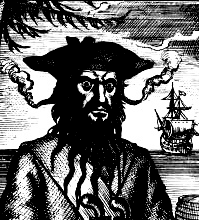Just finished reading
Magellan's Voyage. A Narrative Account of the First Voyage, last night in fact. This is a diary of the first circumnavigation of the globe, written by Italian
Antonio Pigafetta who was a travel companion of Magellan (access ebook
here). The expedition set out from Seville in Spain on August 10, 1519, travelled to South America, Brazil, the
Rio de la Plata (January 1520), found a passage from the Atlantic to the Pacific in November 1520, which was to become known as
Strait of Magellan. The fleet carried on to cross the Pacific and reached the
Marianas and the Philippines by March 1521. Magellan himself was killed in a battle in Cebu, in the Philippines, in April. The fleet carried on to Borneo by June and the
Spice Islands by November of the same year where they bought spices, cloves and cinnamon. Although this was the initial aim of the voyage (with the intention of heading back east and round America in their return), the new captain decided to head west and by rounding the Cape of Good Hope head north and reach Spain that way. As one of the two ships, the
Trinidad, was too damaged to make the journey back to Spain, the Victoria departed alone in December. It rounded the
Cape of Good Hope in May 1522 with only rice for rations. Between the Cape and the
Cape Verde islands 20 crew died of starvation and disease. On September 6, 1522 the Victoria arrived to Spain, three years after its departure.
Pigafetta's description is very graphic, with beautiful depictions of a world previously unknown to Europeans of this time. It includes exact descriptions of locations, names, produce and economies, along with very useful vocabularies of languages encountered in the journey. We have useful information on spices and the cultivation of cloves and cinnamon. At the same time, it slips into exaggeration, such as when describing native tribes of
Patagonia as 'giants', and many other examples where European imagination, prejudice and ignorance prevailed. As an account it is very useful, especially when one comes to consider the conditions of early modern travel and exploration with the practical issues that accompanied it, such as provisions, communication with various linguistic groups and so on. A beautiful, savage and, at times, dreamy account.
Magellan's route (click for large version)






